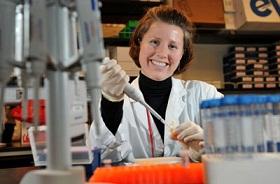Using AI to control energy for indoor agriculture
30 September 2024
Published online 29 December 2010

A postdoctoral researcher at Weill Cornell Medical College in Qatar (WCMC-Q) has received a 100,000 USD grant to develop a practical way to deliver genes into human cells in gene therapy, a potential treatment for certain cancers and heart disease.
Rachel Jones, a researcher who came to WCMC-Q from the School of Medicine at Emory University, Unites States, discovered the unique vector, a particle capable of carrying DNA into cells, while working with Michael Pungente, a senior researcher in WCMC-Q. She will receive 100,000 USD over the next three years for research into molecules that deliver genetic material into cells for therapeutic purposes.
"Tracking traditional vectors in cells usually requires the use of a florescent tag on either the vector or the nucleic acid payload," explained Jones. "This fluorescent tag adds bulk to the vector-nucleic acid complex, changing its size and packing properties, which subsequently changes cellular uptake and release of the nucleic acid payload in the cell."
These tags are unsuitable for gene therapy, making it difficult to predict the behaviour of these vectors without a florescent tag in a clinical setting.
The vector being developed by Jones is a polyene carotenoid lipid derived from vitamin A. It is unique in that it is naturally radiant and visible to the naked eye without a florescent tag. It also has some properties that make it more stable than traditional vector methods in research.
Because the vector can be used without any baggage, the same vector-nucleic acid combinations used during in vitro studies could be used in any human trials.
"This study in particular is an exciting prospect into a critical field that stands to change the way we treat disease into the future." said Khaled Machaca, associate dean for research at WCMC-Q.
"If you want an effective gene therapy, you face barriers because you are inserting material into a complex system – the human body – and there are a lot of dangers before it even gets to its target cell. We hope that tracking this process will help us discover successful therapeutic strategies," said Jones.
Jones is one of six winners of the Young Scientists Research Experience Program (YSREP) offered by the Qatar National Research Fund (QNRF), which awarded a total of 1.4 million USD this year, its inaugural year.
The other five grants went to researchers working in different fields of importance to Qatar, said Mounir Tag, YSREP programme manager. These range from advanced Arabic machine translation to robotics to subcellular microscopy.
doi:10.1038/nmiddleeast.2010.238
Stay connected: